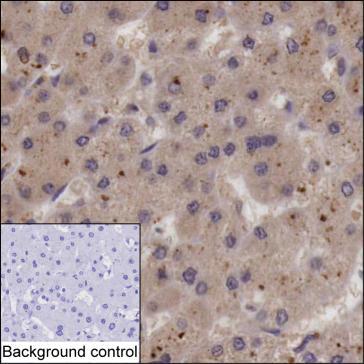
| WB | 咨询技术 | Human,Mouse,Rat |
| IF | 咨询技术 | Human,Mouse,Rat |
| IHC | 1/100-1/200 | Human,Mouse,Rat |
| ICC | 技术咨询 | Human,Mouse,Rat |
| FCM | 咨询技术 | Human,Mouse,Rat |
| Elisa | 咨询技术 | Human,Mouse,Rat |
| Host/Isotype | Mouse IgG2b |
| Antibody Type | Primary antibody |
| Storage | Store at 4°C short term. Aliquot and store at -20°C long term. Avoid freeze/thaw cycles. |
| Species Reactivity | Human |
| Immunogen | Purified recombinant fragment of human SMOC2 |
| Formulation | Purified antibody in PBS with 0.05% sodium azide |
+ +
以下是3篇涉及SMOC2抗体的文献摘要信息,供参考:
---
1. **文献名称**: *SMOC2 promotes immunosuppression and inhibits mesenchymal–epithelial transition in the pancreatic cancer microenvironment*
**作者**: Aguilera et al.
**摘要**: 该研究使用SMOC2抗体检测胰腺癌组织中SMOC2蛋白表达,发现其高表达与免疫抑制性微环境相关,通过调节细胞外基质(ECM)促进肿瘤进展。
---
2. **文献名称**: *Secreted modular calcium-binding protein 2 (SMOC2) is a candidate driver of tumor microenvironment remodeling in colorectal cancer*
**作者**: Mammoto et al.
**摘要**: 通过免疫组化(使用SMOC2特异性抗体)发现SMOC2在结直肠癌中高表达,其通过激活整合素信号通路促进肿瘤微环境纤维化,影响转移和化疗耐药。
---
3. **文献名称**: *SMOC2 mediates fibroblast-ECM crosstalk to promote colorectal cancer progression*
**作者**: Zhang et al.
**摘要**: 研究利用SMOC2抗体阻断实验,证明SMOC2通过调控成纤维细胞分泌的ECM成分激活Wnt/β-catenin通路,从而驱动结直肠癌侵袭性生长。
---
这些文献均聚焦于SMOC2在肿瘤微环境中的作用,并利用其抗体进行功能验证或表达分析。如需具体期刊信息或年份,可进一步补充数据库检索。
The SMOC2 antibody is a research tool designed to detect and study Secreted Modular Calcium-Binding Protein 2 (SMOC2), a glycoprotein belonging to the SPARC-related family of matricellular proteins. SMOC2 is characterized by two calcium-binding EF-hand domains, a follistatin-like (FS) domain, and a extracellular calcium (EC) module, enabling interactions with extracellular matrix (ECM) components and cell-surface receptors. It regulates cellular processes such as adhesion, migration, proliferation, and differentiation, playing roles in embryonic development, tissue repair, and angiogenesis. Dysregulation of SMOC2 is implicated in pathological conditions, including cancer (e.g., colorectal, liver, and pancreatic cancers), fibrosis, and inflammatory diseases, where it often promotes tumor progression, ECM remodeling, and metastatic spread.
SMOC2 antibodies are widely used in techniques like immunohistochemistry, Western blotting, and ELISA to localize and quantify SMOC2 expression in tissues or cell lines. Their application has advanced understanding of SMOC2's dual role in homeostasis and disease—supporting tissue regeneration in healthy contexts while driving pathological ECM stiffening and oncogenic signaling in malignancies. Recent studies also explore SMOC2 as a potential biomarker for disease prognosis and a therapeutic target, particularly in anti-angiogenic or anti-fibrotic strategies. However, challenges remain in elucidating its precise molecular mechanisms and tissue-specific functions, areas where SMOC2 antibodies remain critical investigational tools.
×